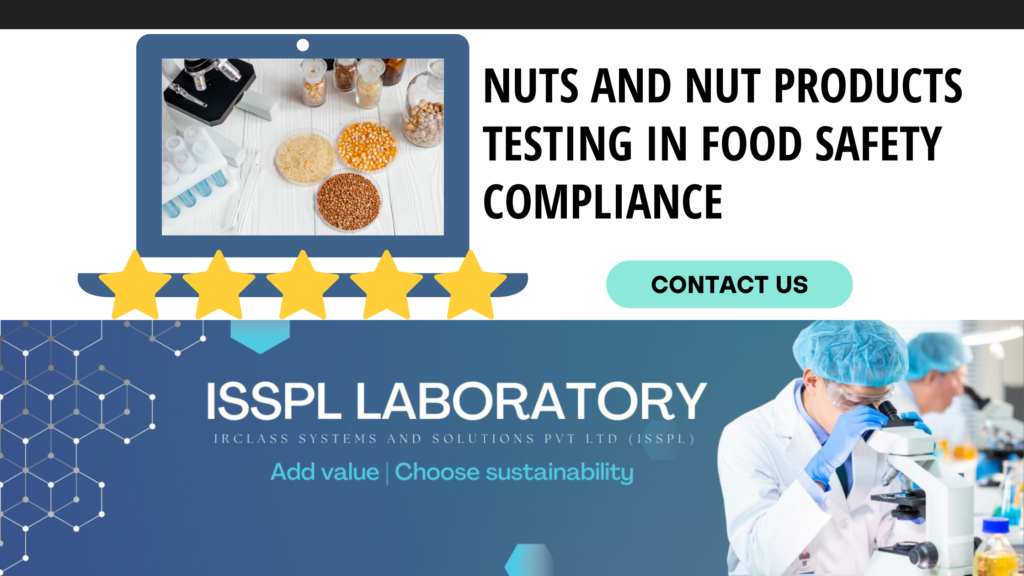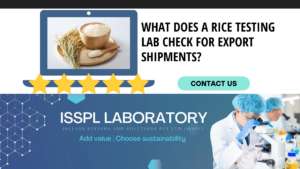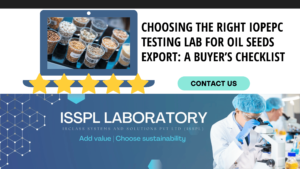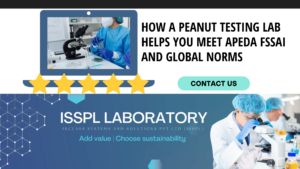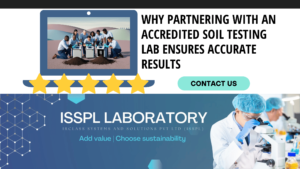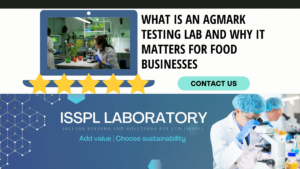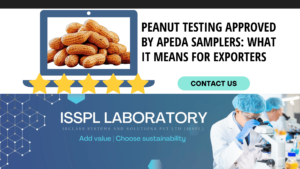An Overview by Team ISSPL - Analytical Testing Laboratory in India
ToggleAlmonds and walnuts, peanut butter and hazelnut spreads are staples of the global food industry. These are known products for their nutrient density, and are consumed in different forms. With widespread consumption comes a lot of responsibility.
Consumer safety is threatened by allergen mislabeling, contamination and quality inconsistencies. Meanwhile, these risks must be mitigated and strict food safety regulations met by rigorous testing of nuts and nut products. In this guide, we’ll take a look at why food safety compliance is so important, what testing standards should be followed and why testing is crucial to avoid recalls.
Finally, we also talk about how ISSPL Testing Lab can support your food safety efforts.
Nut Product Food Safety Regulations
Food safety regulations are intended to protect consumers from hazards and to assure the quality of food products. The way in which nuts and nut products are handled around the world is due to their propensity for contamination and allergens.
1. Global Food Safety Regulations
Various regulatory bodies worldwide have established stringent standards for nuts and nut products:
- FDA (U.S.): Preventive controls in the Food Safety Modernization Act (FSMA) focus on nuts. Facilities are required to identify potential hazards, implement control measures and keep detailed records. Nuts are also limited by the FDA in maximum allowable levels of aflatoxins to protect consumers from these harmful toxins.
- European Union (EU): Under the European Food Safety Authority (EFSA) under the General Food Law Regulation, strict aflatoxin limits and microbiological safety standards are enforced. Secondly, all allergen must be labeled.
- FSSAI (India): The Food Safety and Standards Authority of India tests nut products for aflatoxins, microbiological contaminants and allergens. The labeling practices are stressed in order to protect consumers and prevent misrepresentation.
2. The labeling of allergens.
Nuts are among the most common food allergens and reactions can be life threatening. Regulatory frameworks have been set up by the FDA and EFSA to ensure that allergens are clearly specified on the packaging. The tested allergen traces in production are compliant and protect the consumer who is allergic.
3. Maximum Residue Limits (MRLs)
Pesticides are used in nut cultivation, leaving harmful residues behind. Pesticides in nuts are set with Maximum Residue Limits (MRLs) to be safe. These residues are verified within acceptable levels to safeguard consumer health as well as comply.
Compliance Key Testing Standards.
Without testing, nuts and nut products cannot meet safety, quality and regulatory standards. Advanced techniques detect contaminants, allergens and inconsistencies.
1. Aflatoxin Testing
Aflatoxins, produced by a particular type of mold, are mainly responsible for nut safety. The compounds are toxic, can cause liver damage and cancer, and must be carefully watched.
Global Regulation: Aflatoxin limits vary around the globe: the EU, for instance, limits certain nuts intended for direct human consumption to 4 parts per billion (ppb).
Testing Methods:
HPLC (High-Performance Liquid Chromatography): It quantifies aflatoxins with great precision.
2. Microbiological Testing
Nuts can become contaminated with harmful microorganisms (Salmonella and Escherichia coli [E. coli]) that can cause serious foodborne illnesses.
Common Tests:
- Salmonella detection
- E. coli screening
- Total Plate Count (TPC) assessment for general microbial load.
3. Allergen Testing
Since processing, nut products can introduce allergenic traces that can cause cross contamination and represent very serious risk for consumers with allergies.
Testing Techniques:
PCR (Polymerase Chain Reaction): It’s able to detect DNA from allergenic nuts.
Impact: The United States says 57% of food recalls in 2021 were due to allergen mislabeling, which is why testing is so important.
4. Physical and Sensory Testing
Products are tested for size, color, texture and flavor to make sure that the products meet consumer expectations.

How Testing Prevents Recalls
Food recalls can be devastating to businesses financially, and to brand reputations. These risks are minimized by comprehensive testing that will find problems early.
1. Contaminants Early Detection
Microbiological and aflatoxin testing is run on a routine basis, and contaminated batches are intercepted before they reach the consumers. It prevents regulatory penalties and protects public health.
2. Accurate Allergen Labeling
Mislabeling allergens is one of the leading causes of recalls. Packaging testing ensures that allergenic content is accurately reflected in packaging to protect consumers and maintain compliance.
3. Import/Export Standards
To meet the need for global trade, different regional regulations must be followed. For example, in 2022, 15% of nut shipments to the EU were rejected because they did not meet aflatoxin limits. Importing products is testing your products to make sure they meet the standards of importing countries and avoiding costly rejections.
4. Safeguarding Brand Reputation
Recalls harm consumer trust. Companies that put in the time to rigorously test their products are showing that they care about safety and quality and earn long term loyalty.
ISSPL Testing Lab Can Help Meet Your Compliance Goals
ISSPL Testing Lab offers a full range of nut industry specific testing solutions.
1. Testing Services
ISSPL offers a broad range of services, including:
- Aflatoxin Testing: Detects harmful toxin levels.
- Microbiological Testing: Screens for pathogens such as Salmonella and E. coli.
- Allergen Testing: Complies with labeling laws.
- Pesticide Residue Testing: Verifies adherence to MRLs.
- Physical and Sensory Testing: Assesses product quality.
2. State-of-the-Art Technology
ISSPL uses cutting edge tools like HPLC, and GC-MS, which ensure accurate and reliable results.
3. Regulatory Expertise
We stay updated with global standards like FSMA, EFSA, FSSAI and others.
4. Customized Solutions
Every business is unique. ISSPL offers tailored testing strategies that fit your particular operations and compliance requirements.
5. Rapid Turnaround Times
Delivering timely results so your supply chain doesn’t have to stop.
6. Ongoing Support
ISSPL is also about strengthening your food safety systems through risk assessments and training programs beyond testing.
Conclusion
In the highly regulated, competitive food industry where safety and quality of nuts and nut products are critical. Beyond global standards, it tests to protect consumers and strengthen brand reputation.
By working with ISSPL Testing Lab, you are partnering with industry leading expertise and advanced technology to help you achieve your food safety goals. We’ll help you make products that are safe, compliant and as good as they can be.
